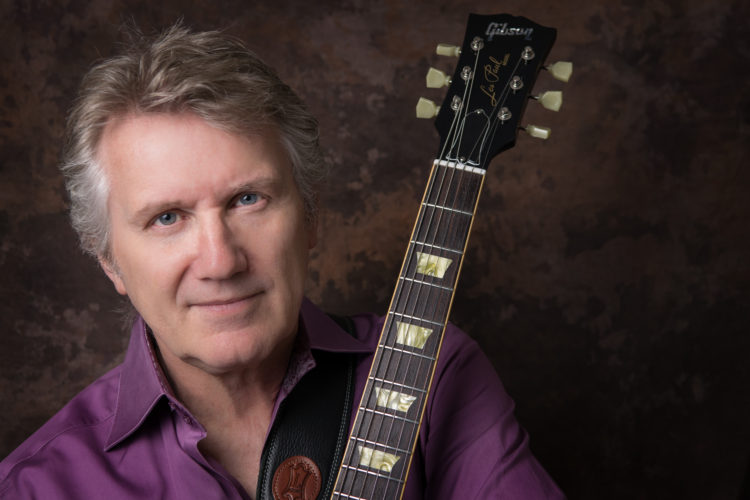
Over a career spanning more than 45 years, Canadian guitar virtuoso and composer extraordinaire Rik Emmett has created a broad, varied, uniquely interesting and always exceptional catalogue of music which constitutes a more than fitting legacy for the eminently talented, Canadian musician and recording artist.
From the bombastic, ear-spitting, anthem days tearing up the international touring scene as one-third of seminal Canadian arena-rockers Triumph, through his experimentations with jazz, blues, folk, rock and classical writing and recording, through to his most recent creations – the bare bones brilliance of his new The Bonfire Sessions, Emmett has truly lived his creative dreams, ticked many things off his artistic bucket list, and looks back with a sense of accomplishment, fondness for past adventures, and most of all a sense of a job well done – in other words, a life well lived.
No, he’s not dying!!! Some fans may have been concerned that in announcing he was retiring from the gruelling road life over a year ago that something was ‘wrong’ with Emmett. On the contrary, something was very ‘right’ with him. He was content. He had done pretty much everything he’s wanted to do during his ‘career’ and is simply looking to transition into a different phase of life – just like an accountant, teacher, welder, or small business owner would upon reaching their mid-60s.
But there is little doubt, when listening to the remarkable diversity and compelling nature of the songs recorded for The Bonfire Sessions, that the creative heart residing within Emmett’s chest is still bursting with ideas and that he is still up for an artistic challenge.
The Bonfire Sessions feature a total of 24 songs, divided up into groups of six for downloading purposes. All were composed solely by Emmett, with his long-time bassist and musical collaborator Steve Skingley doing the engineering [at a separate locale due to Covid-19 distancing restrictions].
“It just seemed logical to break them up into six packs. I sat down and decided which collections of six did I want to do at a certain time and that’s how we went. I have them all written and then we got them all recorded eventually. But besides that we’ve got to get them all mixed and formatted so you can post them and sell them in different ways on different platforms,” he said of the material, all of which , including lyric sheets and other bonus material, is available at his website.
Whether it was dubbed a hiatus from touring, or even retiring from touring, the upshot of it is that Rik Emmett’s days as a road warrior ended for good in early 2019. Once the Covid restrictions lift there may be the odd show here and there, within easy distance of his home just outside Toronto, but for the most part, Emmett has chose to conclude an aspect of his life that has lasted for nearly half a century, and which no longer holds the same allure and fulfillment that it once did.
“I was just getting old and burned out. I mean, I have retired. I am 67 on my next birthday [July 10] and I just got to a point where I still love to play, and I don’t mind performing although there is a little more anxiety now than there used to be. And I had some personal physical challenges in terms of arthritis in my neck and back and arthritis in my wrists and my fingers and stuff. It’s not debilitating to the point where I couldn’t perform, but it changes the nature of the challenge,” he said.
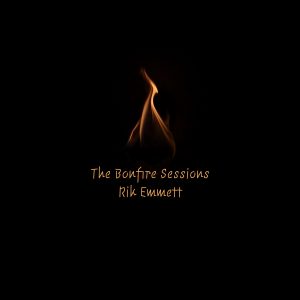 “But the big thing was travelling. I just didn’t want to have to go to all these airports and in and out of hotels and in and out of taxicabs and what ever. I didn’t want to have to stand in line at the rental car booth. I had enough. And it’s not like I need the money. And it’s not like I was a rock star who got divorced three or four times – I am still with the same lovely lady [Jeannette]. There was nothing compelling to drive me to want to keep beating myself up on the road. I do miss sometimes the fun of it or the glamour of it. I certainly wondered how I would be ego-wise because, well, I am addicted to instant gratification of a crowd saying, ‘yeah, you’re wonderful; and we love you.’ How am I going to do if I don’t have that? But I have adjusted, and I found out that I was not as egomaniacal as I was concerned about.
“But the big thing was travelling. I just didn’t want to have to go to all these airports and in and out of hotels and in and out of taxicabs and what ever. I didn’t want to have to stand in line at the rental car booth. I had enough. And it’s not like I need the money. And it’s not like I was a rock star who got divorced three or four times – I am still with the same lovely lady [Jeannette]. There was nothing compelling to drive me to want to keep beating myself up on the road. I do miss sometimes the fun of it or the glamour of it. I certainly wondered how I would be ego-wise because, well, I am addicted to instant gratification of a crowd saying, ‘yeah, you’re wonderful; and we love you.’ How am I going to do if I don’t have that? But I have adjusted, and I found out that I was not as egomaniacal as I was concerned about.
“The other thing is whether it’s a hiatus or whatever you want to call it, I have retired from the road, but I haven’t retired from creativity. That’s the big thing. I kept writing songs and I wanted to do this Bonfire Sessions stuff. Over the last six months I also wrote a book of poetry and have sent it off to a publisher, although I don’t know if they’re actually going to accept it or not. I am waiting to hear back. I guess I am becoming a little more self-indulgent as I get older. I am realizing there are bucket list things that I kind of want to do, creatively speaking. So, that means a lot less or maybe none of the road. There is a part of me that’s going, ‘I don’t think I want it anymore.’ But honestly, I don’t know. Another thing is that I used to love to play Hugh’s Room [in Toronto] once a year and it’s no longer there so what would replace that? I am not sure. Couple that with Covid and when all these things kind of happen you look and wonder maybe it’s a sign from the universe telling me that it’s probably a good idea to hang it up.”
The undiminished creativity has been coupled with so much less wear and tear and time spent being unproductive on the road, with the ongoing Bonfire Sessions, which currently are available as downloads on Emmett’s website, www.rikemmett.com. They are about as stripped back as you can get in terms of instrumentation and production, very much in the vein of the American Recordings by Johnny Cash in the late 1990s an early 2000s. They feature Emmett’s most evocative voices – his singing voice and his playing voice as a guitarist and composer.
“I had a large build up of songs in my notebooks and on the back burner. I had always wanted to make an album that was like what a young Bob Dylan did. One of the first albums I ever owned was the eponymous Bob Dylan album from 1963 and I got it in 1964 and it was one of the first albums I ever had and I used to listen to that thing all the time because I didn’t have many albums. So, it was pretty influential in my early stages of learning how to play and write my own songs. When I started in high school I was already in bands and playing electric guitar, but I would also have a side of me where I would be playing coffee houses at the YMCA on Thursday nights. I would take my little nylon string acoustic and go up there and play a Paul Simon song, a James Taylor song, bastardized version of Roy Clark’s Malaguena. I would do this folk thing and it was as much a part of me as any other part of me that was developing as an artist and a musician,” Emmett explained.
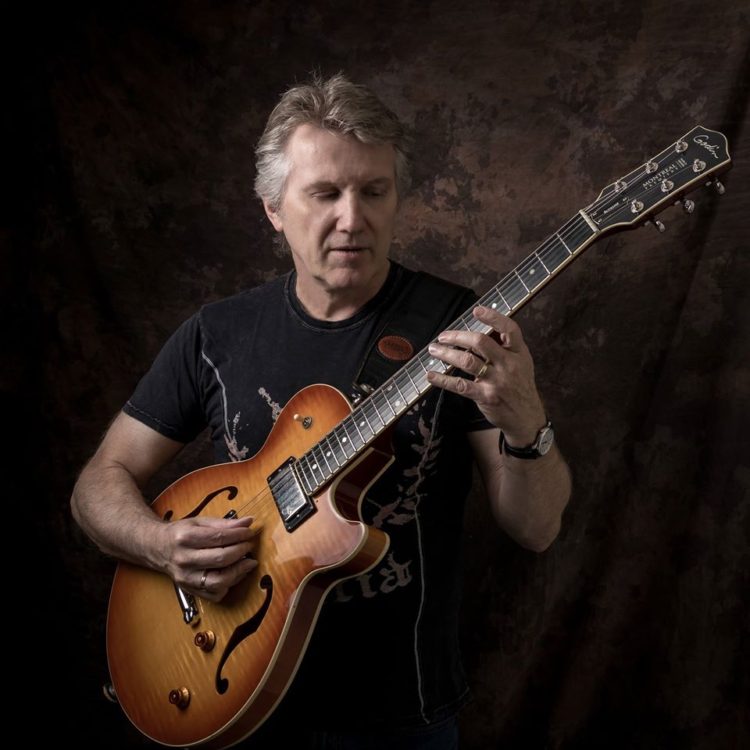
“I always wanted to make a record that was going to be that simple. I had all these songs and I thought these are really … this may be the last thing that I do, so I entitled these things in my notebook, ‘Folk Songs for the Farewell Bonfire,’ as if I was at summer camp and it was the end of the summer and we were going to the last bonfire, and I would bring my acoustic guitar and just sing a bunch of songs. That’s how it started and that’s the actual title of the conglomeration, Folk Songs For the Farewell Bonfire. But it’s an awful stupid mouthful so we just decided to call it the Bonfire Sessions.”
Emmett relates the story of how he and his wife always talked about his point of view on life, where she sees him as always negative and pessimistic, and he sees himself as a realist. There is no sadness or tinges of regret in this conversation – but rather gratitude for the life he has had, and resignation that he has entered what could be his final chapters – the length of those chapters is still to be determined.
“I am not getting any younger. I don’t have any major issue that’s going to take me out of the game in the next little while, but you know there is certainly a part of me that is thinking about the endgame. Especially with my aging dad, who is struggling with dementia, and the fact that I have now lost both my brothers. Also, I am a grandfather now and you kind of do realize that you are in the last chapter. You’ve gotten over the top of the hill and it’s all downhill from here [chuckles]. And you have to start coming to terms with that. So, certainly that’s a big part of where the lyrics were coming from for a lot of these Bonfire songs. It really is a taking stock kind of thing and looking back over a life of being a performer and being a musician,” he said.
“I would say that it’s not necessarily my life that’s getting chucked into the bonfire, but for sure part of what’s burning up, to continue the metaphor, is this whole thing of this guy that used to go out on the road and used to play these shows and make these videos and do a whole bunch of other things. [His media rep] set me up with two interviews today. I used to have to get up at 9 a.m. and do interviews all day long, every 15 minutes or every half hour. My whole life has been that, the whole idea of selling yourself and taking yourself out on the road and hauling your sorry carcass around and smiling for the cameras and stuff. Showbiz is kind of surreal that way. And I am certainly not carping and bitching about it. I have been lucky; it’s been a blessed, graceful kind of a life, all things considered. Having said that, you pay a price, everybody does. You get to a certain point and you think ‘yeah, I guess retirement exists for a reason.’ It’s the notion that you can’t really keep banging away the way you used to, and you really don’t want to. But so many keep doing it either because they have to for financial reasons, or because they don’t know what they’d do if they stopped.
“I think artists are partly to blame, because there’s an ego involved. It’s kind of like an addiction almost in that this is what you do, you reinvent yourself and you come up with a new album and go out on another tour. And then there’s all the pressure that exists from outside, like agents and managers and record companies. I know guys who are on their third wives and alimony is involved, and they’ve got kids from different marriages some of whom are still getting ready to go to college and they’ve got to still be out there working because they need the cash flow. They have an established machine that’s got to be fed. And then there’s the fans: they don’t want you to quit. They want you to come and play those songs that are a part of the soundtrack of their lives and make them nostalgic and feel good about who they are and what their lives have been. Those songs make them feel good, and I get that, because I’ve got those songs that are part of my own soundtrack. And you don’t want to disappoint people. I think that’s a big part of your life as an entertainer is that concept that the show must go on. It’s like old actors in theatre; they don’t know when to hang it up and they can’t because what’s keeping them alive is the whole idea of putting on the makeup, putting on the costumes and going out and pretending, you know?”
With the creation of a book of poetry and a more free and stripped down to the basics approach to the songs on Bonfire Sessions, Emmett said that he is focussing more on words that perhaps he has in the past, noting that there are thematic elements that continue to run through all his songs like a seam of quartz through a hillside – positivity, hope, and optimism generally prevail, even though the are the slings and arrows of outrageous fortune to contend with along the way. After all, this is the man who wrote Magic Power, Fight the Good Fight, Take A Stand and Hold On.
“Lyrics were always important to me on a certain level. When you’re making rock records, like we did in Triumph, or even when you’re making blues records, you’re distilling down the range of what it is you might be writing about. Someone like Bob Dylan doesn’t restrict himself as to what he’s going to throw in there. He doesn’t give a shit if the song ends up being eight minutes long. It’s not a commercial type of writing even though Bob Dylan ends up being commercially successful in what he does. Springsteen writes along the same themes most of the time. It’s the American working man kind of anthems, songs about breaking your back and working really hard and getting your heart broken, and he stays in that vernacular in very general terms. It’s a fairly narrow furrow that he plows, although he is changing things up as he’s getting older too,” Emmett said.
“When I was in Triumph, it was a pretty narrow kind of thing because it’s an arena rock band. But I will still have songs like Ordinary Man [from Allied Forces], things like Never Surrender, that were about something. They’re weren’t just drinking songs or partying tunes or rocking in your car anthems. In some ways that contrast between those songs and what I did, that was one of the things that made the band work and make it interesting. At the same time there are songs like Hot Time in the City Tonight, and Let Me Get Next To You from Triumph and a lot of the stuff from my Raw Quartet solo album [1999] and the songs on there are straightforward rockers about trains, about getting in your car and driving. They’re about as straightforward and straightforward gets. So, I have really run the gamut. I have done a lot of different stuff.
“But, to answer your original question, I have become far more lyrically and word oriented. Writing the poetry was a beautiful, lovely kind of recreational therapy for me, because you didn’t have to make it rhyme and you didn’t have to make it fit into the bar structure of the song that you’ve already written. You don’t have to make the second verse match the phrasing of the first. What a breath of sweet, fresh air it was to be able to be creative and not necessarily have to worry about so many other things. I am glad I did it. It was fun, and of course when you’re writing poetry, you’re pretty much writing autobiographically. You may be veiling it and hiding it and stuff, but I mean I was writing epitaphs for my brother and a million other personal things. The songs on Bonfire, yes, they are definitely lyric oriented, and I am proud of them. I think I did some pretty good work and when I listen back to them, I go, ‘wow, this guy sounds all grown up here. He’s put on his big boy pants and wrote a song with some depth.’”
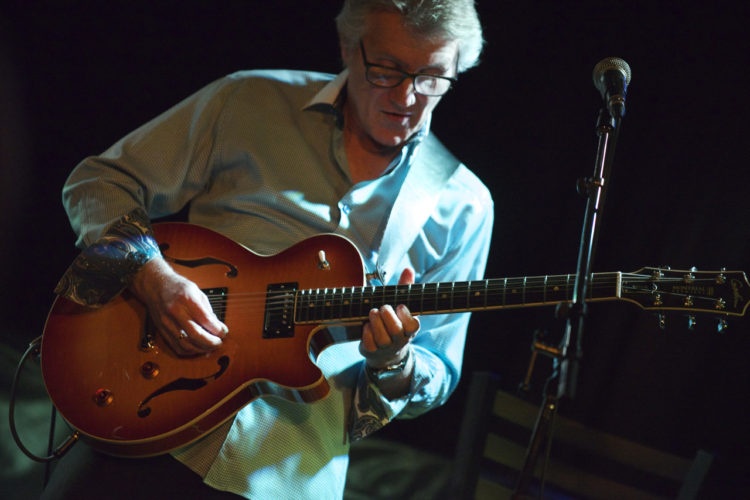
Realistic optimism, tinged with a combination of resignation and wisdom, could be said to be Emmett’s overall approach to lyrics these days, as evidenced by some of the standout tracks on the first Bonfire Sessions offerings, including the hopeful, Everything Is Gonna Be Alright.
“The verses are basically saying that the world is going to hell, and I am getting really old and it’s like, ‘uh oh.’ But then the choruses are like nope, everything’s going to be alright, everything’s going to be fine. Which to me is this bizarre aspect of human nature where, for some reason, there is always hope. We still find things we can be positive and hopeful about even when it’s all seemingly going to shit. Something keeps people alive when they’re in death camps, for instance. Like, what is that? For that song, I was trying to keep it simple, to try to think the way Tom Petty thinks and was so good at. I wanted a simple little chorus that came on like a pop song. Literally the chorus is a pop song, even though the lyric is not necessarily pop in the verses. It’s a contrasting thing where the verses are saying one thing and the chorus is saying something else, something simpler and actually more powerful,” he said.
“And don’t you think that maybe this is where our world is at? Maybe that’s not the way a 17-year-old kid would be seeing the world, but it’s the way a 66-year-old guy was seeing the world at the time. But I still remember what it was like to be 17, but you don’t see the world that way when you get older. That was part in parcel of the thinking there and what I was writing about, for sure. As far as optimism goes, and this bleeds out to all the songs, who is the guy that wrote Magic Power and Fight the Good Fight and Never Surrender. The band was called Triumph and who was the guy who was trying to make it live up to its name, trying to write songs to help it live up to its name. That was me. It was my job and that’s what I tired to do and it’s part of the DNA of pretty much everything I’ve written since.”
Right Here Right Now is also a song that comes from the heart, spirit and mind of someone who has lived life, experienced the ups and downs, the vicissitudes and vagaries of nearly seven decades on earth, including nearly half a century in the wacky world of the music business, and has come out of it with most of his sanity, and a whole lot of wise perspective.
“I did a lot of therapy and was going to see a counsellor kind of person, and they are big on the whole idea of freeing yourself, in terms of stress and anxiety, from the past and from the future. There’s a lot of self-help stuff too that’s pretty much based on the whole idea of being in the present. This is really the only thing that you’ve got any kind of connection and control about, so just be here now. Don’t be yesterday, don’t be tomorrow. The past is the land of regret and the future is the land of dread and anxiety so don’t go to those places, just be here because you can relax when you’re here. You can actually control your breathing and just bring yourself back. So that’s what Right Here Right Now is about. It’s based on the thinking that right here and now is the best place to be,” Emmett explained, adding that the meaning does go a little deeper in that it is, in a way, a plea for the return of the middle ground, especially when it comes to social, cultural and political discussion. Middle Ground, being a song from his first solo album, Absolutely, and another lifelong lyrical theme.
“I just can’t stand Trump, and I can’t stand what America has become when they accept him and support him – I find it almost evil. So, the whole idea of making America great again is about wanting to go to the past, and the past was not all that shit hot. It was f***ing horrible for black people, and women and lots of other people. You’re not going to make it great again if you go back to Jim Crow, and I think that’s being proven.”
Of similar tone and tenor is the compelling track The Maybe In Between, which, again follows the theme of coming together on common ground, with some give and take, to solve problems and create a true community.
“You can go through all the songs and you’re going to find that the roots connect. When they finally blossom and turn into a song above the ground, they’re their own thing, but they are all inter-connected. I have often said that I really only write six or seven songs. I just find a different way to express the six or seven things that I’ve got. It’s a pretty limited palate. The Maybe In Between is about living in the moment. And it’s a commentary about what’s f***ing up the world, which, to me, is so simple it’s such common sense. But we don’t live in a time of common sense. We live in a time of post-truth. Songs like Across the Great Divide are saying that people are building castle walks and they want to climb on top of them and scream at everyone,” he said.
“The gap between left and right has become a f***ing Grand Canyon and it just gets worse all the time. It doesn’t get better. In truth that became the whole Obama things of ‘come on, let’s see how we can work together. Let’s try to meet in the middle, let’s be moderate and calm about this.’ But the right became so entrenched and so siloed that you can’t reach them. They refuse to address the concept of common sense or meeting you halfway. And Trump will continue them focussing on that. It makes it really difficult to get anything done.”
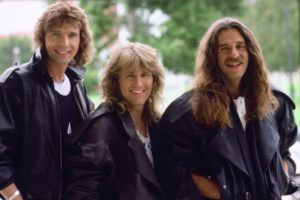
Besides the Bonfire Sessions, Emmett still has his toes dipped in the Triumph pool. The band is currently the subject of a documentary being produced by Toronto’s Banger Films and was also recently inducted in the Canadian Walk of Fame class of 2019. As part of that celebration, a special tribute band was formed, headed up by the incomparable Lawrence Gowan, to blow through the Triumph repertoire, and last year, for an invitation-only special meet and greet related to the documentary in November, Emmett was joined by bandmates Gil Moore behind the kid, and the lanky, long-haired Mike Levine on bass to play three Triumph classics live for the assembled patrons.
“When the conversation was going on about the awards night it was like, ‘well you guys are going to have to get up and play.’ And of course, Gil said, ‘yeah, that’s not going to happen.’ So, what is plan B? We will put together an all-star band, and when I heard that I said, you’ve got to get Gowan. He is the only guy that can sing it, because no one else will be able to hit those notes. And I was telling Larry that he could take them down a key or two and that I take some of them down a whole minor third. But he said, ‘no man, I can do it.’ Because that guy is like an athlete. He is in unbelievable shape,” Emmett explained.
“For the special surprise show for the documentary, we rehearsed for like three or four weeks and we played three songs, Gil, Mike and I, for this Fan Fest that was filmed for the documentary. It was amazing, it was so great, it was like standing in front of a tsunami of love. I think some of the fans knew, because it was invitation only, but I don’t think most had an idea. They were brought to a warehouse and are watching a movie that’s on a screen, but it’s really a scrim. We drop the scrim and the band is standing there with all our instruments on and we started playing and the people, just, oh it was incredible. We opened with When The Lights Go Down, which we used to open a couple of tours with, then Lay it On the Line and Magic Power. And it was just the three of us, the trio, so it was like going back to 1983 or 1984.”
For more information on Emmett and The Bonfire Sessions, visit www.rikemmett.com or his social media channels.
- Jim Barber is a veteran award-winning journalist and author based in Napanee, ON, who has been writing about music and musicians for 30 years. Besides his journalistic endeavours, he now works as a communications and marketing specialist. Contact him at jimbarberwritingservices@gmail.com.
https://www.youtube.com/watch?v=Q32QQewg8p8
SHARE THIS POST:
